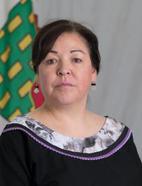Thank you, Madam Chair. I do want to talk about, today, the agriculture strategy, which maybe some of the Members are referring to. It is the public health regulations. The question we ask ourselves is: what are we doing as a department to support the agricultural strategy and food security? Our department helps social services, along the Departments ENR, ITI, and Lands, we are all working together to implement the agricultural strategy. Our main goal here is to ensure that public health is protected in the production and sale of local foods. Also, our work supports the priority of this Assembly, of course, to increase food security by facilitating the local production of food and the sale of food.
If I can, I do want to speak a little bit about the Food Establishment Safety Regulations. Changes to the Northwest Territories Food Establishment Safety Regulations under the Public Health Act came into force on August 15, 2019. These changes supported the last Assembly's priority to move forward on this agricultural strategy and also support this Assembly's priority to increase food security. The changes made it clear that farm gate sales of locally grown, low-risk foods are allowed. It also makes it easier for people to sell locally grown and home-produced foods from home and at farmers' markets.
Those are some of the things that our department is working on. I know that we are responsible for the health act and the Food Establishment Safety Regulations, so I just wanted to bring that forward. Thank you, Madam Chair.
